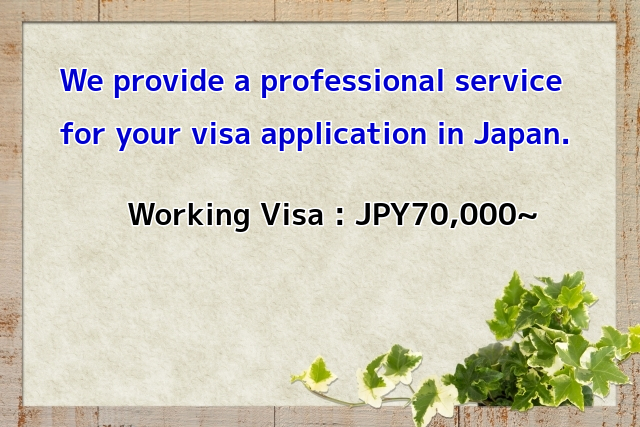
Work-related Status of Residence: Visa required to work in Japan
In order to engage in certain activities in Japan, it is necessary to obtain a ‘status of residence’ as defined by the Immigration Control and Refugee Recognition Act. For example, there are different types of ‘status of residence’ for tourism, studying abroad, working, marrying and living with a Japanese national, etc. Unless you choose the one that suits your activity and apply for and receive permission from the Immigration authorities, you are not permitted to legally engage in activities in Japan.
If you work for a Japanese company, you need a work-related Status of Residence.
(Hereinafter, ‘work-related Status of Residence’ is referred to as a ‘Working Visa’ for convenience.)
Choosing the appropriate Working Visa for your job
Working visas are further subdivided according to the type of work. For example, the type of working visa you apply for is different if you are a chef or an office worker.
It is important to note that the type of working visa you apply for should be determined by the type of work you are responsible for at the company you work for, not the type of company you work for. As a simple example, if you are employed by a restaurant chain and you are in charge of advertising and marketing, you must apply for a ‘technical, humanities or international services’ working visa. Even if you were to obtain a visa under the ‘technical’ working visa that a chef would apply for, you would not be able to work in public relations or marketing on that visa.
Therefore, you first need to know exactly which working visa applies to the work you are going to undertake.
Types of Working Visa
There are the following types of working visa (work-related status of residence).
Each working visa has a specific job description and allows you to work within the scope of that job description. A “working visa” does not allow you to do work that is outside the scope of your working visa. For example, it would be illegal to work as a cook under an working visa to work in an office, no matter how confident you are in your cooking skills!
| Status of Residence | Example |
| Teaching | University professors and lecturers |
| Arts | Composers, painters, etc. |
| Religion | Missionaries sent by foreign religious organizations, etc. |
| Journalism | Foreign journalists and cameramen |
| Business Manager | Owners and managerial personnel |
| Legal/Accounting Services | Lawyers, certified public accountants, etc. |
| Medical Services | Doctors, dentists, nurses, etc. |
| Researcher | Researchers of government agencies, private companies, etc. |
| Instructor | Language teachers, e.g. in primary, secondary and high schools |
| Engineer/Specialist in Humanities/ International Services | Engineers, interpreters, designers, language teachers in private sector, etc. |
| Intra-Company Transferee | Transferees from foreign establishments |
| Highly Skilled Professional | Highly qualified engineers and managers |
| Nursing Care | Care workers, etc. |
| Entertainer | Actors, singers, dancers, professional athletes, etc. |
| Skilled Labor | Foreign cuisine chefs, sports coaches, jewellery craftsmen, etc. |
“Specified Skilled Worker” and “Technical Intern Training” are omitted here.
There are jobs for which visas are easier / harder to get
Working visas are restricted and controlled based on factors such as the working situation and industrial necessities in Japan, so there are some working visas that are relatively easy or difficult to obtain. The criteria is whether the work is specialized, advanced and difficult to be replaced.
So-called ‘manual labour’ industries, such as construction and catering, are difficult to obtain an working visa for. On the other hand, IT technicians and international sectors are industries that the government aims to strengthen, so it can be said that visas are positively granted to these sectors.
The amount of supporting documents you need to submit will depend on whether the visa is easy to obtain or not, although it is always necessary to fulfil the requirements of the respective working visa.
Visas with no restrictions on the nature of work
As explained above, various types of working visa (working-related status of residence) are defined according to the nature of the work, and there are restrictions on the work that can be undertaken. Both job seekers and employers should be aware that deviating from these restrictions will be illegal, no matter how legitimate the job itself is. As an employer, it is helpful to have an employee who is flexible and can take on a variety of different tasks, but the restrictions of an working visa can sometimes make employers hesitant to hire foreigners.
On the other hand, unlike working visas, there are several visas that have no restrictions on the nature of the work.
- Permanent residents
- Long-term residents
- Spouse of a Japanese national
- Spouse of a permanent resident
The above visas (status of residence) are not working visas but status of residence visas (status of residence), which are granted to those who are married to a Japanese national or have acquired permanent resident status. These visas allow the holder to work in almost all jobs, just as Japanese nationals can.

Factors required in a Working Visa application
When applying for a working visa, not only the applicant, the foreigner himself/herself, but also his/her employer is examined.
Therefore, the documents to be submitted with the application must not only include documents relating to the foreigner’s background, but also information that clarifies the company’s status and the performance of the employing company.
The following items are examined by the immigration authorities when applying for a working visa. When applying for a work visa, the applicant must submit various documents to prove that the following items are fulfilled.
Requirements for foreigners (applicants)
Each type of working visa has its own requirements concerning education, working history and other qualifications. For education, a certificate of graduation, etc., and for working, a certificate of previous working, etc., can be used to prove past experience.
Requirements for employer
The company must be in valid existence, comply with the law and conduct its business in a stable and continuous manner.
Registration documents to prove the existence of the company etc., information on capital, turnover, number of employees, clients, etc. and, where necessary, business licensing documents are to be submitted to prove that the company etc. is legally operating and has stability and continuity in business.
Note that the employer does not have to be a limited company; sole proprietors and non-profit organizations can also employ foreigners.
Requirements of the duties for which you are responsible
The work performed by the foreigner must be within the scope of his/her residence status as defined in the Immigration Control and Refugee Recognition Act.
In addition, the volume of work that the foreigner is in charge of with a working visa must be sufficient to justify the need for working. If the immigration authorities have any doubts about this point, then a work schedule of the applicant should be submitted to explain the necessity of working.
Contract between applicant and employer
The employment contract (or notification of employment conditions) between the foreigner and the employer, which states clearly what kind of work the foreigner applying for the visa will undertake and how much he/she will be paid, is an important document to be submitted in the working visa application.
Documents required for a working visa
The documents that must be submitted (presented) vary depending on the type of working visa, but here is an example of the documents required for an application for ‘technical, humanities or international work’, which is the most common type of application for working in general companies.
The documents required will differ depending on the individual circumstances of the foreigner and employer. Depending on the size of the employer, etc., there may be cases where submission can be omitted or more supporting documents may be required.
- Application form [applicant & employer]
- Photograph [applicant]
- Passport [applicant]
- Return envelope
- Curriculum vitae [applicant]
- Certificate of highest educational background [applicant]
- Employment contract or written notice of employment conditions [applicant & employer]
- Certificate of registered matters [employer]
- Total lists of withholding statement [employer]
- Financial statements [employer]
- Company profile [employer]
Application category
Working visas are divided into several application categories depending on the current situation of the foreigner.
For example, if a foreigner is currently living abroad and is seeking job in Japan for the first time, he/she should apply for a ‘Certificate of Eligibility’; if a foreigner is already in Japan on an working visa and changes jobs, he/she should apply for a ‘Permission to Change Status of Residence’. The application is made in accordance with the categories specified for each situation.
Click here for an explanation of the application categories.

We provide prompt and reliable service from the order through to your visa approval.
We have experience in supporting domestic and foreign immigration services. While most Gyoseishoshi (行政書士) only have experience in applying for Status of Residence (Japan Visa), we know what is required at immigration authorities because we have applied for visas to immigration authorities in different countries on behalf of our clients. We can assist you in obtaining a smooth visa by taking into account your individual circumstances and properly understanding what the immigration authorities are looking for.
We are more than happy to help you obtain a visa quickly and at a low cost for standard cases, and to resolve difficult cases by making full use of our experience.
Contact Us
Whether you’re looking for a specialist to work with you and achieve your objectives, or seeking an expert for advice on a particular matter, we’ll make sure the right person for the job gets back to you. Simply fill out the form below.
We appreciate the opportunity to serve you !
Takei International Legal Office

